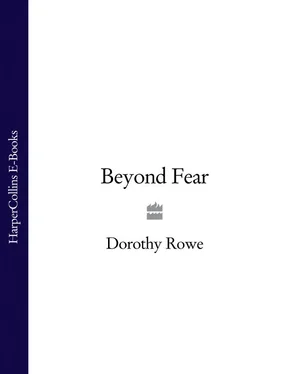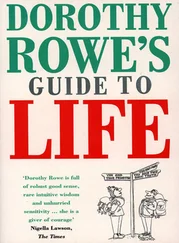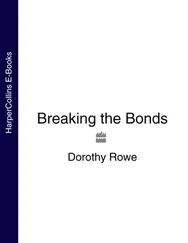Sometimes our fear of old age is more than just a fear of the practical problems it creates. Sometimes there is a magical dimension to our ideas about youth and old age.
Sylvia came to see me distraught after her husband of fourteen years had left her for another woman. All her conversation was about him. If her description of him was in any way accurate I would not have given him houseroom, but Sylvia desperately wanted him back.
They had met and married when she was thirty-four and he was twenty. I asked her what had made her fall in love with him.
‘Chemical reaction. He made me feel so good. Young. Some women don’t get older, do they? Like in those films, you’ve seen them, haven’t you, where there’s this woman and she’s young and very beautiful but really she’s hundreds of years old, and then something happens and she gets old, real old, suddenly, and her body starts to break up, ugh, it’s horrible, and she just crumbles up and her body sort of falls in on itself.’
If this is what she feared old age would be, then it was no wonder that she wanted to hang on to a man who had the power to preserve her, even though he did beat her when he got angry.
When I was researching for my book Time on Our Side 5 I asked a large number of people how they felt about time passing and growing old. All agreed that growing old was frightening, but what made growing old an experience to be feared was different for each person and related to how they saw themselves. Those who had built their identity on achievement feared the time when they could achieve nothing. Those who had built their identity on being needed by others feared being of no use. Those who had built their identity on their sexual attractiveness or sexual prowess feared the fading of their beauty or their loss of vigour.
What people saw as the beginning of the descent into old age depended on how old each person was. People in their twenties saw thirty as the peak of their life, and after that was nothing but decrepitude and decay. People in their thirties saw forty as the turning point, people in their forties saw fifty as the turning point, and so on. I have now turned seventy. Old age, I know, starts at eighty.
Old age does have some actual deficits. Being ill in whatever form is no fun, and we live in a society where old people are not valued, except by politicians when they need the pensioners’ vote, but most of our fears about growing old arise from our ideas about old age. Fearing being ill or losing our physical and mental capacities is bad enough, but if we add to those fears our own prejudices about old people, if we see old people as being ugly, stupid and of no importance, then old age becomes something we dread. However, we are free to change our ideas and thus reduce our fears.
Those of us who enjoy a relatively serene old age have certainly changed our ideas. When we were young many things mattered enormously to us. Now we know how little really matters, but we concentrate on that little which is of immense importance to us, be it those we love, or music, or stories as told on radio, television or film, or simply our garden.
The serenity I enjoy can be interrupted when a chronic lung disease, bronchiectasis, a legacy from childhood, flares up and brings me low. Then I feel frightened, but at the same time I am ruthless in a way I was not when younger in protecting myself from too many demands on my strength. I can achieve this easily because one of the ideas I have discarded is that I must work hard to be good, because no matter how good I am it is never enough. Now, if occasionally I am good, it is solely because it pleases me to be so.
Fear of Not Being Good Enough
When we came into the world as babies we were quite pleased with ourselves and did whatever we wanted to do. We slept when we were sleepy, cried when we were hungry or uncomfortable, and, when offered a nipple, sucked only if we wanted to suck. We had no notion of good or bad. We just were. Then society stepped in and said, ‘This won’t do. You are not satisfactory as you are. You have to be different.’
This all came as a terrible shock to us. We discovered that we were not masters of our own universe. There were greater powers out there and they were insisting that we had to be what they wanted us to be. We had to eat when they wanted and not just when we were hungry. We had to empty our bowels and bladder at the time and place they wanted and not just when we felt the need. We resented this interference, but we knew that the powers that demanded this from us were also the people on whom we depended for survival, and so we acquiesced. We became obedient, and, even more than that, we accepted our family’s definition of us as not being good enough and needing to improve.
Having accepted this as a child, we moved into adult life fearing that we were still not good enough and ready to react with shame and guilt whenever some parental figure chided us for not doing well enough. The editor of Good Housekeeping saw nothing wrong with writing, ‘The other visual treat is the second in our series of Norman Parkinson spectaculars photographed in Tobago. This time it’s summer evening clothes - silky, slinky, sexy numbers. The models look wonderful, very Fifties, very Parkinson and should inspire many of us to take stock and try a little harder.’ 6This was written in 1985, but women’s magazines have not changed, except to increase the range of matters in which women must try harder. It is not enough for a woman to look beautiful and wear beautiful clothes. She must also have a successful career, have a great social life, and be the perfect mother, cook and lover. Women readers react by making an even greater effort to lose weight or else sink deeper into a feeling of inadequacy and despair.
Men do not escape this sorry state of forever trying to do better to justify one’s existence. They have, in some way, to ‘make it’, and when they do not, or when what they have ‘made’ is taken away from them, they become very frightened. Some young men set themselves the goal of having ‘made it’ by the time they are thirty, and so, if they fail, enter their thirty-first year in a state of rage and despair. Others set the vital age at forty, and when the failure to be rich and famous combines with a lessening of sexual performance, they sink into depression, or seek denial in alcohol or in the arms of a much younger woman. Forty is indeed a dangerous age. 7
When we were small babies we had no concept of ourselves as separate entities. We were contiguous with the rest of our world, which presented itself to us as a continuously changing phantasmagoria. Then, by about eight months, most of us made that curious transition to the belief that what we saw was not a display of an infinite range of spectacles, coming fresh to our eyes every moment, but a limited range of spectacles which came and went and then returned. We acquired the understanding that we did not have an infinite number of mothers but just one who came and went and then returned and who was somewhere else when we could not see her. When a favourite toy disappeared, we had some idea of where to look to see it reappear. Making things disappear and reappear became a great delight as we rejoiced in our power to control our universe. We were not always successful at this. Sometimes Mother disappeared and did not reappear, no matter how hard we tried to get her back.
With the belief that objects go on existing even if they are out of sight came the understanding that if objects do this, then it is worth the bother of having some sign that stands for them when they are out of sight. There is no point in having a system of signs if there is an infinite number of things in our universe and their appearance is never repeated, but if events are repeatable then we may as well have some sort of language which we can use in reference to them. So babies who acquire ‘object permanence’, as Piaget called it, go on to acquire language.
Читать дальше












